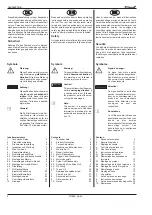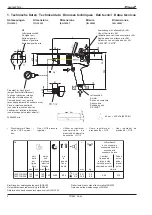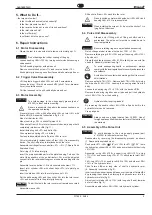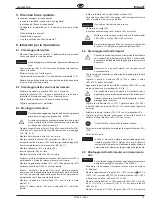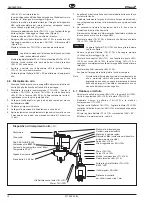
8
P1788E 06/04
140/160PTH.C..
<..>/<..>
=
see 7. Spare Parts Ordering List
<..>
Spare parts index for the 3/4" version
/ <..>
Spare parts index for the 7/16" version
2. Product Description
The pulse nutsetter features
-
torque shut-off,
-
alternative air inlet on top. If the top air inlet is used the screwed
plug <46> must be screwed and sealed in the air inlet on the pistol
grip
-
trigger-start with soft-start valve,
-
has a lockable torque adjustment accessible from the outside
-
reversible, RH and LH operation,
-
generates less than 77 dB(A) when idling and at clockwise rotation
-
generates less than 2,5 m/s² vibration when pulsing
-
Optional shut-off signal for connection to electronic verifier
For safety reasons, the tool must always be disconnected
from the air supply during connection and adjustment work
3. Torque Adjustment
-
Square drive model: prevent turning of hydraulic rotor <69> by
using a wrench size 13 (1/2").
-
In quick-change chuck types pull sleeve <136> forward and click
into place to avoid distortion of the hydraulic rotor <114>.
-
Turn valve screw <83>/<128> with a screwdriver size 3
counterclockwise gently until stop is reached (minimum torque
setting).
-
With about 1 - 4 turns clockwise, set the desired torque
(100 - 160 Nm).
-
If pulse rate < 4 free speed reduce speed by turning exhaust air
throttle <3>. Set bolt <8> must be loosened with wrench size 2 first.
-
Turn exhaust air throttle in direction “-”, speed will be reduced.
Caution!
Caution!
Do not reduce the speed below 1800 ¹/min, as the idling
speed can then become unsteady.
4. Inspection and Maintenance
Regular inspection is essential in order to prevent breakdowns, high
repair costs and long downtimes associated with the pulse nutsetter
Always follow and use the safety notes P1687S and this type-specific
operating manual for maintenance and inspection tasks
The inspection and maintenance list below contains timings, checks
and maintenance tasks to be carried out when the pulse nutsetter has
completed 100, 250 and 500 hours of operation
Operating time = number of rundowns x tightening time
Example: Predicative tasks (250 hours of operation) are to be
carried out at an effective tightening time of, for instance, 1.8
seconds after 500000 rundowns
Preventative tasks after 100 hours of operation
-
Inspect suspension for operational reliability
-
Inspect drive for wear
-
Inspect air supply for firm connection
-
Inspect free speed
Predictive tasks after 250 hours of operation
Replacement of (refer to operating manual)
-
Oil change
-
Hydraulic service kit
-
Motor service kit
General overhaul after 500 hours of operation
Inspection of component parts and replacement as necessary of
-
Suspension
-
Trigger valve
-
Exhaust air throttle
-
Motor unit
-
Pulse unit
Our service team will be glad to provide you with additional advice
Turns of valve screw <83> / <128>
Torque (Nm)
Set bolt <8>
(key size 2; Order-No. 920001)
Torque setting
by means of valve screw <83>/<128>
(key size 3; Order-No. 913947)
Speed setting at clockwise rotation
by means of exhaust ait throttle <3>:
If pulse rate < 4 reduce free speed
Free speed not lower than 1800 r.p.m.
Sample adjustment:
•
Bolt M14 8.8 = 135 Nm
•
Torque adjustment about 3 - 4 turns of valve screw
160PTH256
140PTH25Q
Summary of Contents for 140PTHC Series
Page 31: ......


